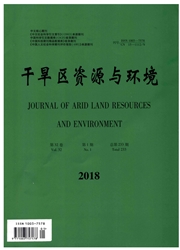

 中文摘要:
中文摘要:
基于天津市实地调查数据,运用二元Logistic回归模型和结构方程模型,分析了生计资产差异对农户宅基地退出意愿的影响。研究结果表明:农户宅基地退出意愿并不高;生计资产差异对农户宅基地退出意愿影响显著,生计资产各构成要素中,物质资产对农户意愿的影响最大,其次是人力资产、心理资产,三者是影响农户宅基地退出意愿的主导因素;而社会资产、自然资产、金融资产对农户意愿的影响相对较小。人力资产、心理资产、社会资产、金融资产对农户意愿具有显著的正向影响,而自然资产、物质资产对农户意愿有显著的负向影响。农户个体及家庭特征、农户所在村庄特征也显著影响农户意愿。最后,提出了相关对策建议。
 英文摘要:
英文摘要:
Based on the field survey data of farm households in Tianjin, we used binary logistic model and struc- tural equation model(SEM) to analyze the influence of the difference of livelihood assets on farmers' willingness to withdraw from rural residential land. The results show that the willingness to exit from rural residential land was not strong in the study area; livelihood assets difference significantly affected the farmers' willingness. A- mong the components of livelihood assets, material assets was the most significant affecting factor, followed by human assets and psychological assets, which were the the dominant affecting factors; while social assets, natural assets and financial assets had small impacts. Human assets, psychological assets, social assets and financial as- sets had significant positive effect upon the willingness rural residential land; while the natural assets and materi- al assets had significant negative effect. Personal characteristics of farmers and family, characteristics of villages also significantly influenced farmers' willingness rural residential land. Relevant suggestions were finally put forward.
 同期刊论文项目
同期刊论文项目
 同项目期刊论文
同项目期刊论文
 期刊信息
期刊信息
